#Rosehip Seed Oil
Explore tagged Tumblr posts
Text
Oone Cosmetics' Best Rosehip Oil for Face Unlocks Radiance
Enjoy Oone Cosmetics' best rosehip oil for face transformational advantages. Our meticulously formulated solution uses organic rosehip seeds to brighten and rejuvenate. The oil reduces fine wrinkles, scars, and hyperpigmentation, giving you a natural glow.
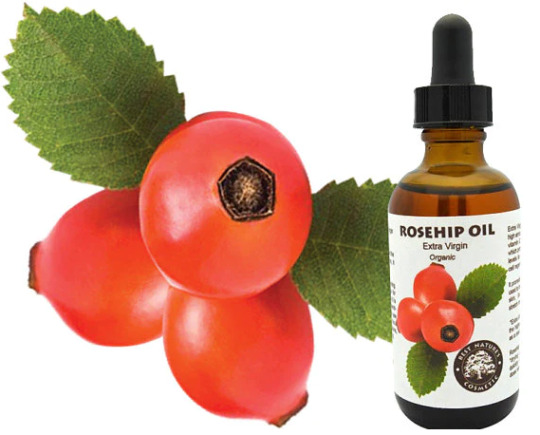
0 notes
Text
Unlock the Secret to Glowing Skin; Discover the Benefits and Best Ways to Use Rosehip Seed Oil
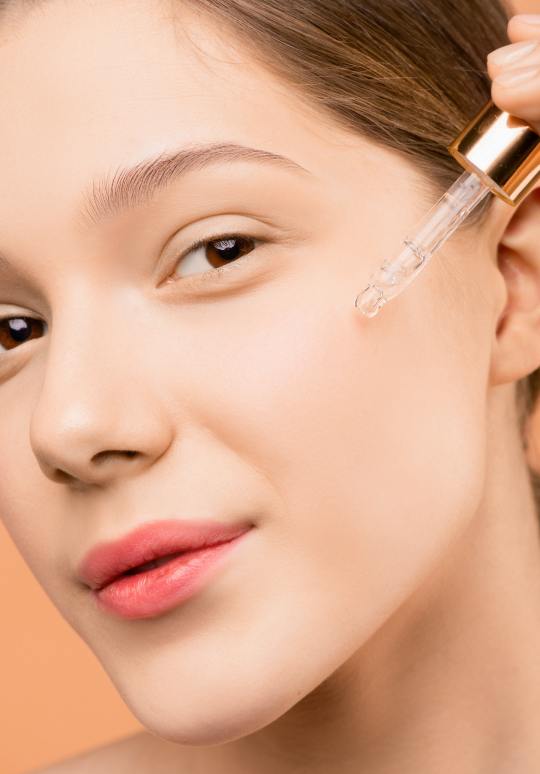
Rosehip seed oil is a powerful ingredient that has been used for centuries to improve the overall appearance and health of the skin. It is rich in antioxidants, vitamins, and essential fatty acids, making it an excellent choice for those looking to achieve a glowing complexion.
Rosehip oil for face - One of the main benefits of using rosehip seed oil on your face is that it can help to reduce the appearance of fine lines and wrinkles. This is due to the high levels of vitamin A found in the oil, which is known for its ability to stimulate collagen production and improve skin elasticity.
In addition to its anti-aging properties, rosehip seed oil is also incredibly hydrating. It contains essential fatty acids, such as linoleic acid and linolenic acid, which help to lock in moisture and keep the skin plump and supple. This makes it an excellent choice for those with dry or dehydrated skin.
Another benefit of using rosehip seed oil on your face is that it can help to reduce the appearance of scars and hyperpigmentation. This is because it contains vitamin C, which has been shown to have a brightening effect on the skin. It can also help to improve skin texture, making it smoother and more even.
When it comes to using rosehip seed oil on your face, there are a few different ways to incorporate it into your skincare routine. One option is to use it as a moisturizer. Simply apply a few drops to your face after cleansing and toning, and massage gently into the skin. You can also mix a few drops of rosehip seed oil with your favorite moisturizer for an extra boost of hydration.
Another way to use rosehip seed oil on your face is as a serum. Apply a few drops to your face before moisturizing, and allow it to absorb into the skin before applying any other products. This can help to provide an extra layer of hydration and nourishment to the skin.
Overall, rosehip seed oil is a versatile and powerful ingredient that can help to improve the overall health and appearance of your skin. Whether you use it as a moisturizer or serum, incorporating it into your skincare routine can help to give you the glowing complexion you've always wanted.
#pure rosehip oil#rosehip oil#rosehip seed oil#rosehip oil for face#rosehip oil for hair#rose hip seed oil#rosehip oil for skin#best rosehip oil#organic rosehip oil#rosehip oil for acne#best rosehip oil for face
0 notes
Text
Rosehip Seed Oil
Discover the power of Rosehip Seed Oil for your skin and hair. Our natural, cold-pressed oil is packed with essential fatty acids, vitamins, and antioxidants to nourish, hydrate, and restore your complexion. Shop now for the best results

0 notes
Text
Unlock Hair Bliss: Nourishing Hair Oil Infused with Natural Goodness
Transform your hair care routine with our Nourishing Hair Oil! Packed with essential nutrients and antioxidants, it strengthens strands from root to tip, promoting growth and vitality. Embrace the beauty of nourished hair today!
0 notes
Text
#rosehip#seed#oil#rose#geranium#the#ordinary#hip#for#face#farsali#gold#elixir#damascus#skin#best#otto#bulgarian#perfume#indulgeo#essential#price#water#oily#jasmine#cold#pressed#gulab#attar#acne
0 notes
Text
Best natural skin ingredients for your skin type ✨
🌿 For Dry Skin
1. Coconut Oil: Deeply moisturizes and locks in hydration.
2. Shea Butter: Rich in fatty acids and vitamins, soothes and nourishes.
3. Avocado Oil: Packed with omega-3s and vitamins A, D, and E to repair the skin barrier.
4. Honey: A humectant that retains moisture and soothes irritation.
🌿 For Oily/Acne Prone Skin
1. Tea Tree Oil: Natural antibacterial properties help combat acne.
2. Aloe Vera: Soothes inflammation and hydrates without clogging pores.
3. Witch Hazel: Controls excess oil and reduces redness.
4. Jojoba Oil: Balances sebum production and keeps skin hydrated.
🌿 For Combination Skin
1. Rosehip Oil: Balances oil production while hydrating dry areas.
2. Green Tea Extract: Reduces inflammation and combats oily zones.
3. Cucumber Extract: Hydrates dry areas and calms oily regions.
4. Chamomile: Soothes irritation and evens out skin tone.
🌿 For Sensitive Skin
1. Oatmeal: Calms redness and reduces itching.
2. Calendula: Anti inflammatory properties soothe irritation.
3. Aloe Vera: Gentle hydration and healing.
4. Sweet Almond Oil: Light and soothing for sensitive, reactive skin.
🌿 For Aging/Mature Skin
1. Argan Oil: Rich in antioxidants and essential fatty acids for elasticity.
2. Vitamin C (from natural sources like Kakadu Plum): Brightens skin and boosts collagen.
3. Pomegranate Seed Oil: Fights free radicals and enhances skin regeneration.
4. Bakuchiol: A plant-based alternative to retinol for smoothing fine lines.
🌿 For Hyperpigmentation/Uneven Skin Tone
1. Licorice Root Extract: Naturally lightens dark spots.
2. Turmeric: Reduces pigmentation and boosts glow.
3. Papaya Enzymes: Gently exfoliates to reveal brighter skin.
4. Rose Water: Balances skin tone and reduces redness.
NOTE:
Always patch-test new ingredients.
Use oils sparingly for oily skin.
Layer hydrating ingredients like aloe vera under thicker oils for maximum moisture.
129 notes
·
View notes
Text
So I just started reading A Court of Thorns and Roses (audiobook), and am I the only one who is wondering if the author did any research into poor subsistence living or the lives of peasants? Because wow, I know Feyre’s family used to be rich, but if that was 8 years ago and y’all are poor as dirt now, somehow in the intervening period you might have learned:
- trap lines in the winter are far superior to active hunting. It burns less calories, you can use it with fish and land animals, and it will save you from frostbite bc instead of sitting in a blind for hours, you can go to your lines at certain times and head home, or drive animals toward your lines.
- buying flower seeds - or any garden seeds - is a suckers game when you’re poor. You only really need to buy seeds once!! Once you harvest, you let stuff ‘go to seed’ and then you collect it and store it for the winter, often trading seeds with your neighbours.
- they let things actively RUN OUT before doing anything about it. That’s absolutely buckwild if you’ve ever been poor — when you’re poor, you know how to make a meal stretch, and you DO IT.
- there is hunting, but no gathering?? This family has not stored any veg for winter, but neither do they go gather mushrooms, rosehips, roots, tubers, nuts, or even fucking bark?? What happened to their cottage garden?? Was it just flowers?! Were they that rich that they don’t understand that a garden produces food? Did they close their eyes as they walked past all their peasant neighbours and their gardens? Bc that’s maybe the wildest thing I’ve seen from both a historical and a ‘grew up so close to dirt poor you couldn’t tell the difference’ perspective!
- She left a whole ass Giant wolf carcass when her family is starving. Nah nah nah no that is the universe smiling on you when you’re subsistence! You will make a travois or somehow find a way to tie that to you and drag it along - that’s double the food, and possibly more money, because you could live off the wolf (which I assume does not taste great) and sell off some of the deer (which is delicious).
- she didn’t at least do a basic clean of her kill out in the woods?! She did not tan the hides?! Y’all, you do not want to be cleaning any kill on the kitchen table. Why? Because cleaning involves removing the intestines and stomach. That means shit and piss and food digestion in different stages, and the gases produced. You do that *outside*, typically at least close to where you made your kill, because you don’t want to have to have any…spills, and because it makes things a bit lighter to carry. Butchering? For sure do it on a table, but cleaning is an outdoor chore. Also, tanning a hide is not just skinning a creature! It’s scraping all the membranes off it, stretching and drying it, and curing the skin - sometimes with smoke, but often with a pretty gross solution (often including brain oil, and historically, I believe urine and/or feces, and other things with the right chemical components). It’s not a simple or quick task!
- soups, pottages, stews, with dried lentils, beans, or peas would have been the staple meals (depending on the climate and environment, but it feels fairly British thus far). Just having roasted venison (def not the best way to eat venison just from taste alone) would likely be a very very rare occurrence, because, as noted earlier, they’re so poor they would need to make it stretch. You would cure it or dry it or turn it into sausage. You would use it sparingly within a meal, not to serve as the whole meal.
- the market. If you were poor, you would likely be a stranger to spices, but not to salt. Salt is deeply necessary to survive in that period, as it’s one of the only ways of safely processing and storing meat with any longevity. And? If you got the money that they did while being as poor and as starving as they were? The first thing you would do — even if you were the most stupid rich person before then — is stock up your stores of dry goods! Flour, salt, honey, dried beans/peas/lentils, vegetables that store - onions, squashes, potatoes, root vegetables like carrots. It’s straight up Maslow’s Hierarchy of Needs here - you will not give a shit about a new cloak before you give a shit about saying your hunger. They are said to be ‘starving’. Sorting out your survival comes before sorting out your fashion.
Anyways, this has been me for channel 4, reporting on anachronisms and misrepresentations in fantasy fiction. More news at 10.
#which is not to say I’m not enjoying the book#though I am glad I got past the poor people stuff#because tell me you’ve never been a peasant without telling me you’ve never been a peasant#I thought a lot of this was common sense but then a lot of people don’t need sense this common I guess#but it’s a fun book so far#acotar#a court of thorns and roses
379 notes
·
View notes
Text
The Magickal Properties of Carrier/Base Oils
In ancient times, our ancestors revered the power of oils, utilizing them in sacred ceremonies, rituals, and magickal workings that spanned centuries. Today, we have the privilege of carrying on this tradition by creating our own blends using the same flora & fauna that have been cherished for millennia. The practice of crafting sacred oils connects us to our roots, offering a meaningful way to honor the past while enriching our present-day experiences.
Carrier/base oils play a crucial role in the world of magick and holistic practices. These oils, derived from plants, seeds, and animal fats, are believed to possess unique energetic properties that can enhance the potency of essential oils and other magickal ingredients we add to them. Whether used in aromatherapy, massage, ritual work, or spell work the choice of carrier oil is significant, as each oil is associated with specific magickal attributes, such as grounding, protection, or amplification of intention. Understanding the magickal properties of carrier oils can empower practitioners to create custom blends that resonate with their intentions and desired outcomes, adding an extra layer of enchantment to their craft.
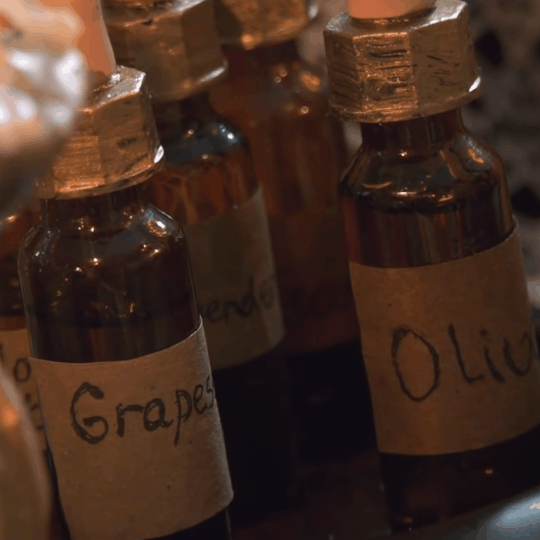
Magickal Properties of Carrier/Base Oils:
These plant and seed-based oils come from my own grimoire based on my own traditions and practice.
Almond: Prosperity, Money, Wisdom
Apricot: Happiness, Contentment, Love
Argan: Healing
Avocado: Love, Lust, Sex Magick
Borage: Higher Mind, Truth, Clarity, Legal Matters
Canola/Rapeseed: Neutral Base
Castor: Protection, Absorbs Negativity
Coconut: Purification, Cleansing, Protection
Corn: Abundance, Luck, Divination
Evening Primrose: Psychic, Glamour, Clarity
Flaxseed Oil: Beauty, Protection
Grapeseed: Fertility, Money, Strengthening Mental Abilities
Hempseed: Meditation, Psychic, Healing
Jojoba: Healing
Meadowfoam Seed: Protection
Neem: Fortifies, Protection
Olive: Healing, Fertility, Protection
Peach Kernel: Fertility, Love, Fae Magick
Peanut: Grounding
Pomegranate Seed: Divination, Love
Pumpkin Seed: Health
Rosehip: Self-Love, Beauty, Glamour
Safflower: Sex, Baneful
Sesame: Hope, Faith, Positivity
Shea Butter: Calming, Longevity, Patience, Healing, Soothing, Beauty
Sunflower: Happiness, Health, Wisdom, Sun Magick
Vegetable: Neutral
#pagan witch#traditional witchcraft#witchcraft#magick#witch#witches#witchblr#witch community#witchcore#spellcraft#spellcasting#spellwork#spells#folk magic#ritual#occult#mountain witch
388 notes
·
View notes
Text
Ayurvedic Oils for Planetary Energy: Enhancing Wellness and Balance ✨🌿
In the ancient wisdom of Ayurveda, oils are not just nourishing elixirs for the body but also potent carriers of planetary vibrations, offering a holistic approach to wellness and balance.

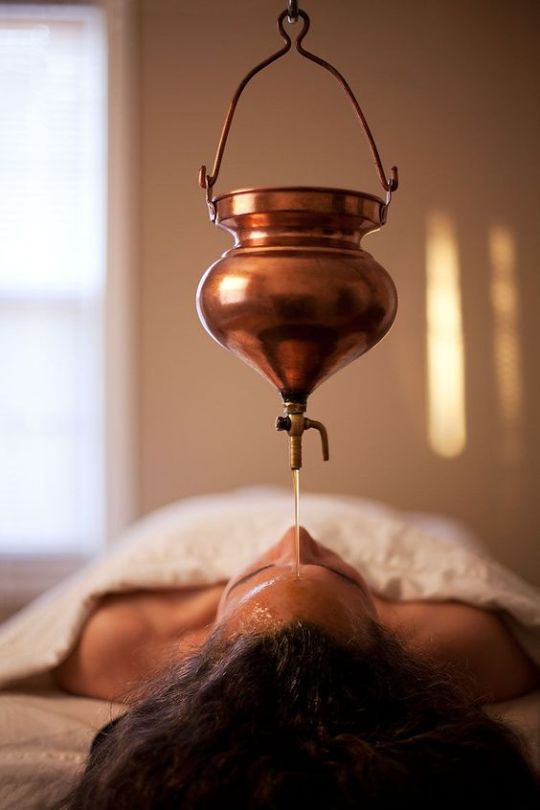
1/Sun Energy: Coconut Oil
Benefits: Harness vitality and strength with coconut oil. Its nourishing properties promote healthy skin, hair, and digestion, enhancing overall vitality and radiance.
How to Use: Incorporate coconut oil into daily cooking, skincare, and hair care routines for a boost of energy and vitality.
2/ Moon Energy: Almond Oil
Benefits: Embrace nurturing and soothing energy with almond oil. Its moisturizing qualities calm the mind and nourish the skin, promoting emotional well-being and tranquility.
How to Use: Massage almond oil onto the skin before bed or add a few drops to bathwater for a relaxing and rejuvenating experience.
3/ Mars Energy: Sesame Oil
Benefits: Channel fiery energy with sesame oil. Its warming properties stimulate circulation, boost immunity, and promote courage and strength.
How to Use: Use sesame oil for self-massage (abhyanga) or as a cooking oil to invigorate the body and mind.
4/ Mercury Energy: Jojoba Oil
Benefits: Embody communicative energy with jojoba oil. Its balancing properties support clear thinking, mental agility, and adaptability.
How to Use: Apply jojoba oil to the scalp and hair for hydration and balance, or use it as a carrier oil for essential oil blends to enhance focus and concentration.
5/ Jupiter Energy: Grapeseed Oil
Benefits: Align with expansive energy with grapeseed oil. Its light texture and antioxidant properties support growth, prosperity, and optimism.
How to Use: Use grapeseed oil as a moisturizer or massage oil to promote vitality and well-being, or add it to homemade skincare products for a radiant complexion.
6/ Venus Energy: Rosehip Seed Oil
Benefits: Embrace harmonious energy with rosehip seed oil. Its rejuvenating properties promote beauty, love, and creativity, nurturing inner and outer radiance.
How to Use: Apply rosehip seed oil to the face and body to reduce signs of aging and promote a glowing complexion, or use it as a natural alternative to moisturizers and serums.
7/ Saturn Energy: Castor Oil
Benefits: Embody disciplined energy with castor oil. Its detoxifying properties promote endurance, responsibility, and resilience.
How to Use: Use castor oil for oil pulling or as a massage oil to promote detoxification and grounding, or apply it to the scalp and hair for nourishment and strength.
8/ Rahu Energy: Neem Oil
Benefits: Harness transformative energy with neem oil. Its purifying properties help release toxins and negative patterns, promoting clarity and spiritual growth.
How to Use: Use neem oil as a natural remedy for acne or fungal infections, or incorporate it into skincare products for its antibacterial and antifungal properties.
9/ Ketu Energy: Frankincense Oil
Benefits: Embrace mystical energy with frankincense oil. Its grounding properties support meditation and introspection, promoting spiritual insight and inner peace.
How to Use: Diffuse frankincense oil during meditation or add it to skincare products for its rejuvenating and calming effects, promoting overall well-being and spiritual growth.
Incorporate these Ayurvedic oils into daily life to align with planetary energy, enhance well-being, and promote balance and harmony. 🪔🌿
120 notes
·
View notes
Text
Rose hips are the fruit of the rose plant. Every rose blossom that is left unpicked will eventually develop a berry-like hip after the flower fades away. Each hip contains rose seeds inside, along with hundreds of little fuzzy hairs. Rose hips are edible and have medicinal values.
39 notes
·
View notes
Text
Hair Oiling
After you wash your hair with shampoo and get out of the shower, put a few drops of oil on your mids + ends to lock in moisture. Makes your hair soft 10/10 habit I've started
Not the most accurate test but it's the one I did

Low porosity
jojoba oil
argan oil
almond oil
avocado oil
Medium porosity
Black seed oil
Grapeseed oil
Neem oil
Rosehip oil
High porosity
Castor oil
Coconut oil
Olive oil
4 notes
·
View notes
Text
Oone Cosmetics' Best Rosehip Oil for Face Unlocks Radiance
Enjoy Oone Cosmetics' best rosehip oil for face transformational advantages. Our meticulously formulated solution uses organic rosehip seeds to brighten and rejuvenate. The oil reduces fine wrinkles, scars, and hyperpigmentation, giving you a natural glow.
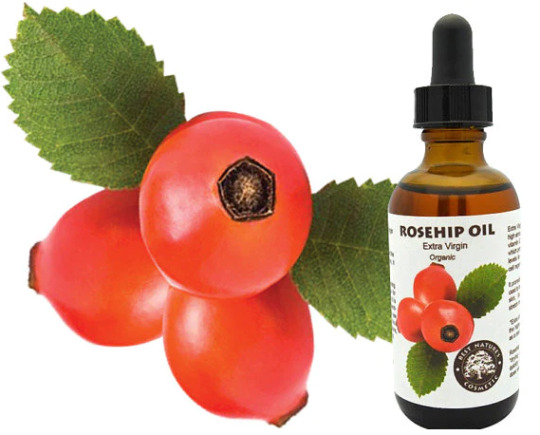
0 notes
Text
Unlock the Beauty Secrets of Rosehip Oil; The Miracle Elixir for Perfect Skin
Rosehip oil has been making waves in the beauty industry for quite some time now and for good reason. This miracle elixir has been used for centuries to treat a wide range of skin issues, from scars to stretch marks, and it's all-natural, which means no harsh chemicals or additives.
So, what exactly is rosehip oil? It's a cold-pressed oil that's extracted from the seeds of the rosehip fruit, which is native to Chile. It's packed with antioxidants, essential fatty acids, and vitamins A and C, which are all essential for healthy skin.
The benefits of rosehip oil are numerous. Firstly, it's incredibly moisturizing and can help to soothe dry, flaky skin. It's also known for its ability to reduce the appearance of fine lines and wrinkles, thanks to its high concentration of vitamin A.
But that's not all - rosehip oil can also help to fade scars and hyperpigmentation. This is because it contains a compound called retinoic acid, which is a form of vitamin A that's been shown to improve skin texture and tone.
In addition to its anti-aging properties, rosehip oil is also great for acne-prone skin. It's non-comedogenic, which means it won't clog pores, and it contains anti-inflammatory properties that can help to soothe redness and irritation.
So, how do you use rosehip oil? It's incredibly versatile and can be used in a number of ways. For example, you can apply a few drops directly to your face as a moisturizer, or mix it into your favorite serum or moisturizer for an added boost of hydration.
You can also use rosehip oil as a spot treatment for scars or hyperpigmentation. Simply apply a small amount directly to the affected area and massage it gently.
In conclusion, rosehip oil is truly a miracle elixir for perfect skin. Whether you're looking to reduce the appearance of fine lines and wrinkles, fade scars and hyperpigmentation, or soothe dry, flaky skin, this all-natural oil has got you covered. So, why not give it a try and unlock the beauty secrets of rosehip oil? Your skin will thank you for it!
#pure rosehip oil#rosehip oil#rosehip seed oil#rosehip oil for face#rosehip oil for hair#rose hip seed oil#rosehip oil for skin#best rosehip oil#organic rosehip oil#rosehip oil for acne#best rosehip oil for face#rosehip oil for scars#pure rosehip seed oil
0 notes
Text
Rosehip Seed Oil for Hair | RAZZO Haircare
Check out the market trendy rosehip seed oil for hair. Visit RAZZO Haircare, Here you can find a great range of rosehip seed oil with complete specifications. Grab this opportunity now!
Our revolutionary leave-in hair treatment cream goes above and beyond. Infused with natural oils, silk extracts, botanical ingredients and next-generation complexes, this beautifully lightweight and nourishing formulation does it all, from inner strength to outer beauty.
Read the complete specifications related to the product to follow the below link- https://bit.ly/3W7YCwT
0 notes
Text
I've been using some hypochlorous acid shit in the morning and rosehip seed oil plus a calming toner at night and my face is loving it apparently. I keep getting compliments about how my skin looks good even though there's still plenty of hormonal acne around my mouth lol
14 notes
·
View notes
Text
Best 5 oils for healthy hair that help with growth, boost shine & strengthen hair ✨
1. Black Seed Oil 🖤 Rich in antioxidants and fatty acids, it promotes hair growth, reduces thinning, and prevents dandruff. Its anti inflammatory & antifungal properties strengthen and revitalize hair
2. Amla Oil 🌿 Packed with vitamin C, it strengthens your roots, promotes growth & reduces hair loss. It also helps to darken hair naturally & prevent premature graying
3. Rosehip Oil 🌹 Rich in vitamins A and C, it repairs damaged hair, boosts moisture, and adds shine. It helps reduce dandruff, dryness & split ends
4. Jojoba Oil ✨ Similar to natural oils, it protects against dryness, breakage and split ends while preventing bacteria & reducing inflammation
5. Argan Oil 🍂 Packed with vitamin E, it nourishes dry, damaged hair, adds shine and tames frizz. Known as "liquid gold," it also protects against heat and UV damage
159 notes
·
View notes